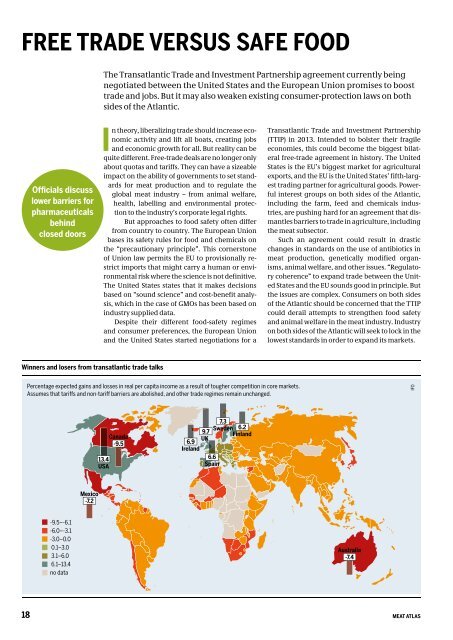FREE TRadE VERSUS SaFE FoodThe Transatlantic Trade and Investment Partnership agreement currently beingnegotiated between the United States and the European Union promises to boosttrade and jobs. But it may also weaken existing consumer-protection laws on bothsides of the Atlantic.officials discusslower barriers forpharmaceuticalsbehindclosed doorsIn theory, liberalizing trade should increase economicactivity and lift all boats, creating jobsand economic growth for all. But reality can bequite different. Free-trade deals are no longer onlyabout quotas and tariffs. They can have a sizeableimpact on the ability of governments to set standardsfor meat production and to regulate theglobal meat industry – from animal welfare,health, labelling and environmental protectionto the industry’s corporate legal rights.But approaches to food safety often differfrom country to country. The European Unionbases its safety rules for food and chemicals onthe “precautionary principle”. This cornerstoneof Union law permits the EU to provisionally restrictimports that might carry a human or environmentalrisk where the science is not definitive.The United States states that it makes decisionsbased on “sound science” and cost-benefit analysis,which in the case of GMOs has been based onindustry supplied data.Despite their different food-safety regimesand consumer preferences, the European Unionand the United States started negotiations for aTransatlantic Trade and Investment Partnership(TTIP) in 2013. Intended to bolster their fragileeconomies, this could become the biggest bilateralfree-trade agreement in history. The UnitedStates is the EU’s biggest market for agriculturalexports, and the EU is the United States’ fifth-largesttrading partner for agricultural goods. Powerfulinterest groups on both sides of the Atlantic,including the farm, feed and chemicals industries,are pushing hard for an agreement that dismantlesbarriers to trade in agriculture, includingthe meat subsector.Such an agreement could result in drasticchanges in standards on the use of antibiotics inmeat production, genetically modified organisms,animal welfare, and other issues. “Regulatorycoherence” to expand trade between the UnitedStates and the EU sounds good in principle. Butthe issues are complex. Consumers on both sidesof the Atlantic should be concerned that the TTIPcould derail attempts to strengthen food safetyand animal welfare in the meat industry. Industryon both sides of the Atlantic will seek to lock in thelowest standards in order to expand its markets.winners and losers from transatlantic trade talksPercentage expected gains and losses in real per capita income as a result of tougher competition in core markets.Assumes that tariffs and non-tariff barriers are abolished, and other trade regimes remain unchanged.IFO13.4USaCanada-9.56.9Ireland9.7UK7.3Sweden 6.2Finland6.6SpainMexico-7.2-9.5–-6.1-6.0–-3.1-3.0–0.00.1–3.03.1–6.06.1–13.4no dataaustralia-7.418MEaT aTlaS
The United States has for years tried to repulseEU restrictions on genetically modified organismsand the use of controversial food and feedadditives. There is the case of ractopamine, usedin the United States as a feed additive to increaselean meat production in pork and beef. Its use isbanned in 160 countries, including the EuropeanUnion, largely because of the lack of independentscientific studies assessing its safety for humanhealth. Currently the United States is not allowedto export meat from animals treated with ractopamineto the EU. American agribusiness and meatprocessingcompanies want the EU to lift this banand include the issue in the TTIP negotiations.After several years of relative quiet, an oldtrade dispute has been reopened. Under the TTIP,the USA is once again seeking approval of peroxyacid,a substance with antimicrobial propertiescommonly used in the USA to clean raw poultryafter slaughter. In the EU, using peroxyacid is seenas contrary to the “farm to fork” concept of minimizingthe use of chemicals, allowing only hotwater for decontaminating poultry.Also, the TTIP presents an opportunity formultinational corporations to bypass Europeancitizens’ opposition to genetically modified foods,many of which are prohibited in the EU. The USgovernment and food companies have challengedthese rules as unfair “technical barriers” totrade. Now, through closed and non-transparentnegotiations, the fear is that the EU will use theTTIP negotiations as a reason to lower standardson the use of genetically modified organisms.The EU, for its part, is seeking to overturn theUS ban on beef imports from the EU. The UnitedStates prohibits the use or import of feed ingredientsthat are known to transmit bovine spongiformencephalopathy (BSE, or “mad cow disease”).Food-safety advocates in the USA are concernedthat EU policies governing the use of feed additivesmade from ruminants are not strongenough to prevent contamination. Since the EUis currently considering relaxing the standardsthat regulate the use of feed additives made fromruminants, the risk of trade in beef contaminatedwith BSE would increase.Moreover, food-safety measures that seek toeliminate health and environmental impacts ofthe meat industry could be challenged underthe “investor-state dispute settlement” mechanism.This clause present in many trade agreementsallows companies to sue governments forcompensation over rules that affect their profits.Agribusiness firms are lobbying to make foodsafetystandards “fully enforceable” through theinvestor-state mechanism in the TTIP. Since thismechanism gives international investors the legalright to “stable investment conditions”, makingchanges in environmental or animal health lawwould be much more difficult.The TTIP could also make it much more difficultto address the negative environmental, socialMeat trade between the USA and the EUImports and exports, million dollarstotal meat tradeUSAbeef, vealpoultry, eggsand health aspects of industrial animal production.Instead of driving standards to the bottom,consumers and activists in the United States andthe EU should demand that governments use theopportunity of the TTIP to raise standards andrigorously regulate the meat industry. Or theyshould abandon the talks altogether.Feed trade between the USA and the EUImports and exports, million dollars2010 2011 2012corn (maize)sorghumfeed andfodderUSAoil seedssoy2010 2011 2012946 1,154 9881,652 2,031 2,154136 231 223298 326 355219 218 199741 868 84543 239 1838 239 1320 492 2652,072 1,632 2,6761,108 795 1,481217 270 265872 928 1,016847 897 976EUporkcheeseEUfeed andfodderoil seedsolive oilUSDA ERSUSDA ERSMEAT ATLAS19


